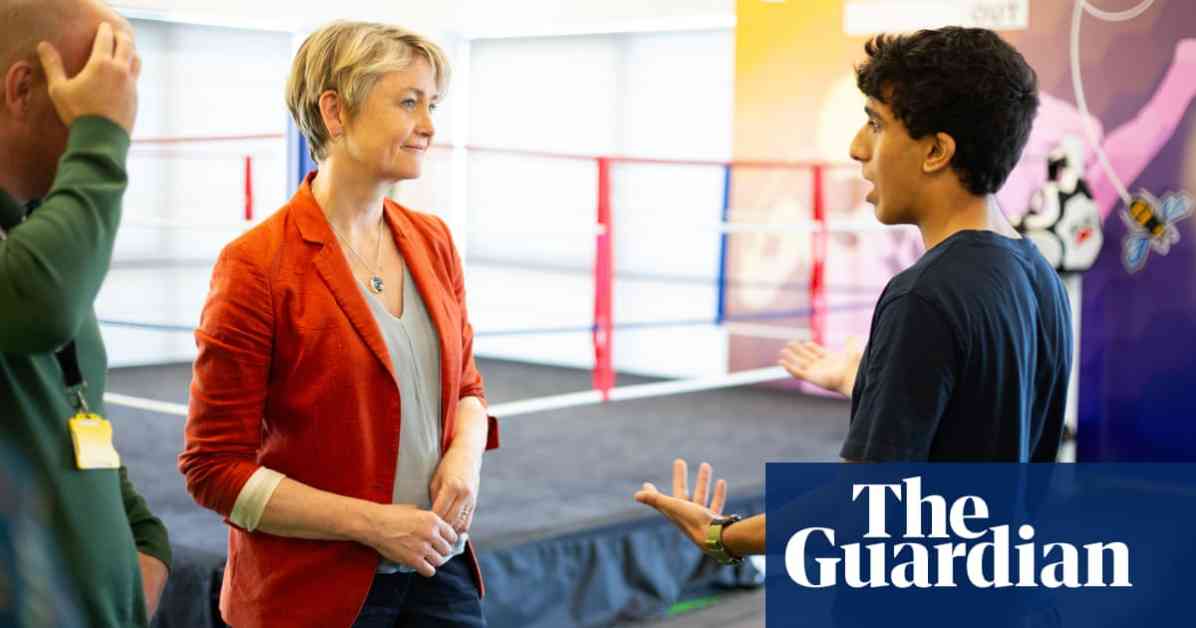Teenagers today face a myriad of challenges that previous generations did not have to contend with. According to Yvette Cooper, these challenges include the prevalence of knives, mental health pressures, and the impact of social media. In response to the escalating issue of violent crime among young people, Cooper has announced plans for a new unit to address these issues and prevent further tragedies.
Initiating a New Approach
Following the tragic deaths of young people in stabbings in various cities across the UK, including Nottingham, Wolverhampton, and Croydon, Yvette Cooper has taken a proactive stance in combating youth violence. She has proposed the creation of a new cross-government unit called “young futures,” which will be based in the Home Office. The goal of this initiative is to halve violent crime within a decade and address the root causes that lead young people down the path of criminal activity.
Speaking from a youth center in the Manchester suburb of Gorton, Cooper expressed her deep concern over the recent killing of three children in Southport, describing it as “deeply traumatic and just absolutely awful.” She emphasized the links between knife crime and the inadequate treatment of mental health conditions, highlighting the serious challenges faced by young people in today’s society.
Collaborative Efforts to Tackle Youth Crime
As part of the new approach to addressing youth violence, the home secretary has urged councils and police forces to develop proposals to tackle crime among young people by Christmas. New guidelines will be implemented by the end of the year to facilitate collaboration between police, mental health professionals, schools, youth offending teams, and charities in steering teenagers away from criminal behavior.
Cooper emphasized the need for a coordinated effort to support teenagers through the challenges they face, including the pressures of social media, the influence of county lines and child criminal exploitation, and the rising rates of antisocial behavior. The young futures program aims to provide all teenagers with the necessary support and resources to navigate these difficulties and build a positive future.
A Comprehensive Approach to Youth Well-being
In addition to addressing the immediate concerns of youth violence, the young futures program will focus on creating “youth hubs” to support teenagers in a manner similar to the Sure Start initiative for babies and toddlers launched during the Blair administration. The overarching goal is to give all teenagers the best start in life by identifying those most at risk of being drawn into violence, exploitation, crime, and antisocial behavior.
Cooper acknowledged the fragmented and neglected support for teenagers under successive Conservative governments, citing the challenges faced by councils in coordinating services for high-risk youth. The Commission on Young Lives has highlighted the need for a more cohesive approach to meeting the needs of vulnerable teenagers and providing timely access to mental health services, which have seen a significant increase in referrals in recent years.
The disparity in educational outcomes across regions, as evidenced by this week’s A-level results, further underscores the need to address the systemic issues that impact young people’s well-being. While national exam grades have reached historic highs, regional variations persist, with areas in the north trailing behind the south-east. Cooper emphasized the government’s commitment to supporting all young people and reducing violence against women and girls as part of a broader effort to improve youth outcomes.
Expressing frustration with the slow pace of change, Cooper stressed the importance of taking decisive action to address the root causes of violence and support young people in realizing their full potential. The young futures program represents a long-term vision for preventing youth crime and empowering young people to shape their own futures.
Challenges and Opportunities Ahead
Despite the ambitious goals set forth by the young futures program, Cooper acknowledged the challenges ahead in achieving lasting change. The program aims to mobilize the entire country in a concerted effort to reduce violence against women and girls and provide young people with the resources they need to thrive.
While the recent tragedy in Southport has sparked national outrage and calls for action, Cooper urged caution in assigning blame and politicizing the incident. She emphasized the need for a comprehensive approach to addressing youth violence and supporting the families affected by such senseless acts.
The outbreak of unrest following the Southport attack raised questions about the role of political rhetoric in fueling tensions. Cooper condemned the criminal behavior of the rioters and stressed the importance of holding individuals accountable for their actions. She also called for social media companies to take responsibility for preventing the spread of misinformation and ensuring public safety.
As the government works to implement the young futures program and tackle the underlying issues that contribute to youth violence, Cooper remains committed to driving meaningful change and improving the lives of young people across the country. The challenges faced by today’s teenagers are complex and multifaceted, but with a collaborative and holistic approach, there is hope for a brighter future for the next generation.

















